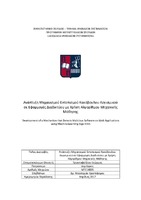Ανάπτυξη μηχανισμού εντοπισμού κακόβουλου λογισμικού σε εφαρμογές διαδικτύου με χρήση αλγορίθμου μηχανικής μάθησης
Development of a mechanism that detects malicious software on web applications using machine learning algorithm

View/
Keywords
Μηχανική μάθηση ; Naïve Bayes ; Python ; Μηχανισμός ανίχνευσης ; Κακόβουλο λογισμικό ; Machine learning ; Anti-malware mechanism ; Malicious softwareAbstract
This postgraduate thesis aims to resolve one of the most serious threats web
administrators face in their jobs: Quick identification of unknown malicious software,
when this compromises their systems. Using the current solutions, it is not possible
for this malicious software to be directly detected thus resulting in the jeopardization
of information systems.
Unlike currently existing counter-measures, this project has been designed and
developed to be able to detect malicious software using machine learning and the
Naïve Bayes algorithm, which is used in spam filters and has the ability to detect, with
high percentage, an unknown malicious file.
Two tests were designed to measure the results of the anti-malware project.
These were based on the fundamentals of assessing the effectiveness. In these tests,
the project was compared, in terms of effectiveness, with three other open source
anti-malware applications, which are broadly used by web administrators in order to
detect malicious software.
The final results of the mechanism showed that it can achieve high detection
rates, because it detected all of the malicious software that had been injected to the
server, whereas it also decreases false positive rate errors drastically.


